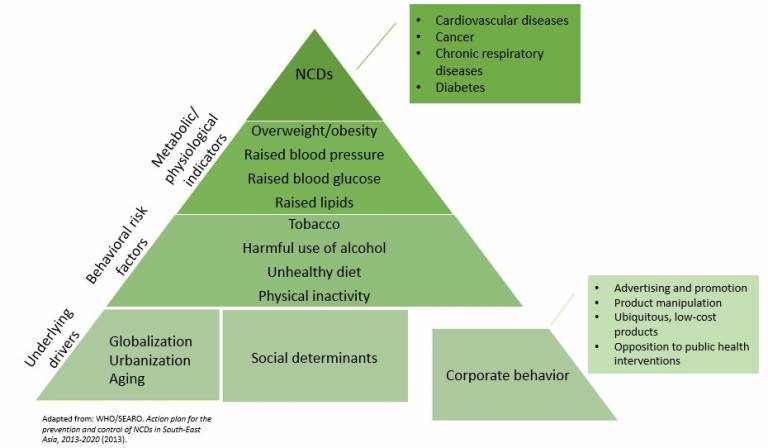We are all increasingly aware of the vast array of tactics employed by the tobacco, alcohol, and junk food industries to encourage us to consume their hazardous products. For decades, Big Tobacco deliberately deceived the public about the dangers of smoking and exposure to second-hand smoke. The alcohol industry targets products and advertising at young people. Junk food “children’s meals” are movie-themed and often packaged with toys for children to collect.
Policies and laws that address non-communicable diseases (NCDs) typically target four shared, modifiable risk factors (tobacco, the harmful use of alcohol, unhealthy diets, and physical inactivity) that are largely responsible for cardiovascular disease, cancer, respiratory diseases, and diabetes. While some policies and laws address underlying corporate drivers of NCD risk factors—for example, bans on soda and snack vending machines in schools and restrictions on cigarette advertising—most of the policy dialogue continues to emphasize individual behavioral factors rather than their underlying corporate drivers.
Conceptualizing corporate behavior as an underlying driver of NCDs and incorporating corporate behavior as part of the NCD policy dialogue are important steps towards reducing or eliminating these behaviors and addressing the NCD epidemic.
Adding corporate behavior to the pyramid of NCD risk factors

What types of corporate behavior drives risk factors such as tobacco smoking and unhealthy diets?
Industry employs a wide range of strategies to encourage us to consume their hazardous products, from ensuring low prices and easy access to unhealthy products to state-of-the-art advertising and promotion. When lawmakers seek to enact public health regulations to reduce consumption of unhealthy products, for example, they often face well organized and well resourced industry or industry-affiliated opposition. The American Beverage Association (ABA) spent $11M to oppose recent ballot measures for taxes on sugar-sweetened beverages in the cities of Berkeley and San Francisco, California. The ABA directed over 80% of the funds to opposing the San Francisco measure, which was ultimately defeated. Likewise, the food and beverage industry dedicates an enormous amount of resources to engineering junk food so consumers are compelled to come back for more. Even more worryingly, many of these tactics are kept secret, avoiding government oversight or public transparency.
Why should we recognize corporate behavior as a driver of NCDs?
The simplest answer to this question is that being honest about the underlying drivers of NCDs will help us find the best solutions. Increasingly, policy-makers are recognizing and where possible, addressing the underlying causes of NCD risk factors, including globalization, urbanization, and the social determinants of health. Conceptualizing and talking about corporate behavior as part of the complex web of NCD risk factors would help build public awareness of the problem and political will to solve it. It would help ensure that the relevant industries and companies are held responsible for their contribution to the NCD epidemic. It would make it more difficult for industry, and society, to blame and shift responsibility to individuals.
Just like smoking, harmful alcohol consumption, unhealthy diets, and physically inactive lifestyles, corporate drivers of NCDs are modifiable. As a society, we can lessen and eliminate corporate behaviors that drive us towards obesity, diabetes, and cancer. To me at least, it doesn’t seem like a difficult choice.
Latest
Mantener la prohibición de la exhibición indirecta de productos de tabaco salva vidas
Ariadna Tovar Ramírez Fernanda Rodríguez-Pliego



